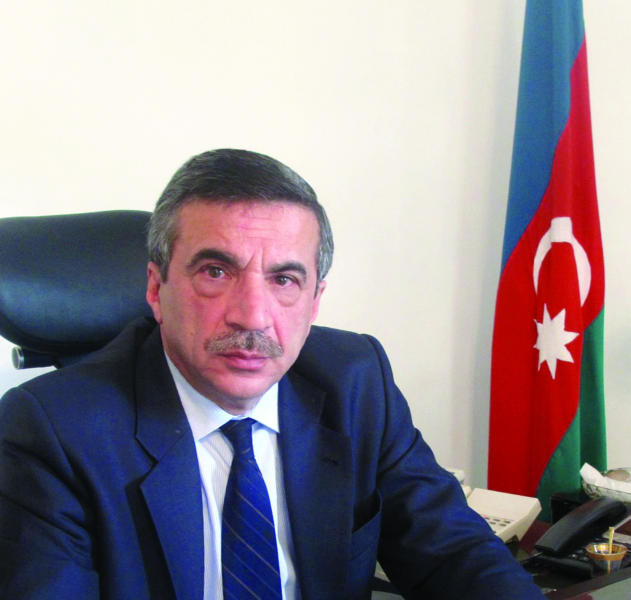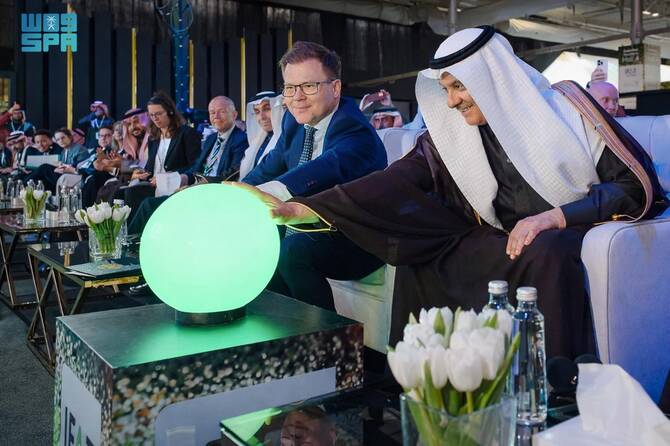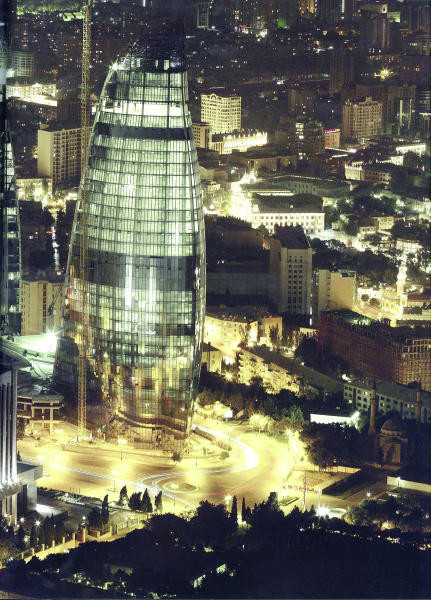Azerbaijan and Saudi Arabia have concluded 12 agreements, with 10 more deals expected to be signed in the near future. In an exclusive interview with Arab News, Azerbaijan Ambassador to Saudi Arabia Rasim Rzayev said political, economic and cultural relations between the two countries will continue to develop. Speaking on the growing ties between the two member states of the OIC, zayev said that in recent years, these relations have been further strengthened and expanded. Delegations comprising businessmen and managers of major Saudi companies have visited Azerbaijan.
The ambassador said four Saudi companies from various fields are currently operating in Azerbaijan. This year in Baku, they signed a memorandum of understanding for the implementation of long-term projects in the Kingdom in the field of oil and gas between the State Oil Company of the Azerbaijan Republic and the Saudi company Soroof International, he added.
“The friendly relations between the two leaders of these countries play an important role in the development of bilateral relations. Also, there is ongoing cooperation in the field of medicine. Azerbaijani doctors in Saudi Arabia hold high respect for this country. By working here, they have proved that they have sound knowledge and rich experience.”
The ambassador noted that Azerbaijan is a member of the Jeddah-based Organization of Islamic Cooperation (OIC), whose Secretary General Ekmeleddin Ihsanoglu visited Azerbaijan in June this year. During his meeting with President Ilham Aliyev, Ihsanoglu emphasized OIC support for a just solution to the Armenian-Azerbaijani Nagorno-Karabakh conflict. He noted that this support will continue in future.
The ambassador said Azerbaijan continues supporting programs and initiatives of the OIC in the fulfilment of its tasks. Recently, Azerbaijan voluntarily contributed $ 3 million to support the activities of the OIC General Secretariat.
The ambassador also discussed the growth and development of bilateral relations over the last 20 years and also alluded to the upcoming Day of Solidarity of Azerbaijanis around the world being celebrated every year on Dec. 31. Dubbed “The Day of Solidarity of Azerbaijanis of the world,” it symbolizes the unity and cohesion of the Azerbaijani people and national sympathy and loyalty to their motherland.
Ambassador Rzayev, who was posted here recently, told Arab News that 20 years ago on Feb. 24, 1992, the Republic of Azerbaijan established diplomatic relations with the Kingdom, which was one of the first countries to recognize the independence of Azerbaijan. In April 1994, the Azerbaijani Embassy opened in Riyadh, followed by the Embassy of Saudi Arabia in Baku in June of 1999.
He said the visit of former Azerbaijani President Heydar Aliyev in 1994 to Saudi Arabia opened new opportunities for the development of bilateral relations. During the visit, the two countries signed the first General Agreement on cooperation in the fields of economy, trade, investment, technology, culture, youth and sports.
“Azerbaijan and the Kingdom of Saudi Arabia combine comprehensive brotherhood,” he observed. “This relationship of mutual respect and sincere friendship strengthens our similar histories and common Islamic heritage. Our peoples have similar roots in the culture and tradition, as well as in religion,” he added. During the pilgrimage season between 1998-1999, 250 pilgrims from Azerbaijan visited Makkah and Al-Madinah as a guest of the late King Fahd.
Referring to the situation in Armenia vis-a-vis Azerbaijan, the ambassador said Saudi Arabia has always supported their position during the voting process at the UN General Assembly on “the situation in the occupied territories of Azerbaijan,” as well as the OIC and other international and regional organizations. In this context, the ambassador explained how the Saudi government condemned the so-called presidential elections in the “Nagorno-Karabakh republic” and once again supported the territorial integrity of Azerbaijan.
Saudi Arabia is one of the first countries to provide active humanitarian assistance. From 1994-1999, Saudi Arabia, starting with the program under King Fahd, repeatedly provided humanitarian assistance to refugees and IDPs and provided them with food, medicine and other necessities. Several disabled persons of the Karabakh war in 1999 were treated in Saudi Arabia.
In 2002, within the framework of projects for the construction of secondary schools in Baku, the “Saudi Fund for Development” (SFD) extended a loan amounting to SR 35.7 million riyals to the Government of Azerbaijan. In 2005, the Saudi government provided Azerbaijan financial assistance worth $ 50,000 for demining operations and also for the rehabilitation of people in the liberated territories of the country.
He said the first session of the intergovernmental commission between the Azerbaijan Republic and the Kingdom was held in 2001 in Baku. A new stage in the development of bilateral relations followed the official visit of President Ilham Aliyev to Saudi Arabia in 2005.
During the visit, an agreement between the two governments was signed on the “Promotion and Protection of Investments” and the loan agreement between “Saudi Fund for Development” and Azerbaijan to finance the construction of a water channel in Azerbaijan.
“It should be noted that the relationship between the two countries also extends to the field of culture,” said the ambassador. “ Azerbaijani Culture Days were held on 10-17 November 2007 in Riyadh, as well as in the cities of Jeddah and Dammam. The event was attended by a large delegation from the faculties of arts and sciences. Furthermore, the cultural days of Saudi Arabia were held on 17-21 June 2008 in Baku. The Minister of Culture and Information also led a 100-member delegation to Azerbaijan.”
The President of Azerbaijan, Ilham Aliyev, also awarded the Saudi Ambassador to Azerbaijan, Ali Hassan Jaafar Ahmad, the “Order of Glory” award for his contribution to the development of friendly relations between the two countries.
Ambassador Rzayev said relations between the parliaments of the two countries are still growing. The Chairman of the Majlis-e-Shoura Abdullah bin Mohammed bin Ibrahim Al Al-Sheikh led a delegation to Azerbaijan on an official visit in 2010. Subsequently, the speaker of the “Milli Majlis” (national parliament) of the Republic of Azerbaijan, Oktay Asadov, paid an official visit to the Kingdom as the head of an official delegation.
Pointing out that historically and also culturally, Islam has always been a major factor in promoting peace and tolerance in the world, he said it has made a great contribution to the harmony and prosperity of all nations regardless of their faith. “Consolidation of our efforts within the OIC to prevent Islamophobia is strongly needed,” he observed.
Due to its strategic geographical location at the crossroads of Europe and Asia, Azerbaijan had played a bridging role between Eastern and Western civilizations for centuries. Azerbaijan has always promoted Islamic cultural and spiritual values in the world. Along with other Muslim countries, Azerbaijan has provided significant assistance to the recently opened “Islamic art” section of the Louvre museum in Paris, which contains works of architecture, art and other cultural expressions of Islamic civilization.
“We would once again like to express our sincere gratitude to the Custodian of the Two Holy Mosques King Abdullah bin Abdulaziz Al Saud and the people of the Kingdom for their valuable support to the just cause of Azerbaijan in the ongoing conflict with Armenia who currently occupies twenty percent of Azerbaijan’s territory. Around one million indigenous Azerbaijanis have been expelled and ethnically cleansed from their native lands and thousands of Azerbaijani cultural and historical monuments, including Islamic heritage sites, were devastated and looted.”
Speaking on his country’s “Day-of-Solidarity-with-Azerbaijanis” around the world, the envoy said: “This remarkable day, commemorated annually during the last 21 years on the initiative of our national leader Heydar Aliyev, warms the hearts of all our compatriots around the world. It underlines the warmth of the motherland and inculcates love of the independent Azerbaijan.”
“The government of Azerbaijan attaches particular importance to the national unity of our compatriots and always keeps the diaspora in focus,” he added. “The Third Congress of World Azerbaijanis held in Baku last summer laid the foundation for a new phase of organizational development of our compatriots living in foreign countries and strengthened their ties with the motherland.”
The Congress provided an assessment on the activity of diaspora institutions and made important decisions that gave an impetus to efficient and organizational mobilization of the people.
He added that it is very encouraging to witness the spirit of Azerbaijanism among compatriots living away from home and that their sense of national sympathy is growing stronger by the day. “Today, our compatriots living abroad are gradually stepping up their position in the public, political, cultural and business life of their respective countries and contributing a lot to the popularization of Azerbaijan in the world and to the promotion of our culture.”
“Azerbaijanies have cultivated their age-old, ethnic, native lands which constitute Great Azerbaijan for thousands of years. Yet following war, revolution and military conflict, a percentage of Azerbaijanis were exiled and separated from one another as a result of division. Others, in their search for jobs and education for their children, have left their native land and settled down in other countries. And for the entire duration of history, Azerbaijanis from the great land of Azerbaijan have been dispersed around the world. Now, Azerbaijanis live in almost every country of the world. Large communities of the diaspora have been formed in Russia, in other countries of Commonwealth Independent States, in the Caucasus, in neighboring Georgia, Dagestan, Iran, Turkey, Europe, America and in oriental countries. National feelings grow among them day by day. They have tried to establish closer relations among themselves and feeling increasingly united.”
“The victory of our representatives at the prestigious international cultural competition - the Eurovision-2011 song contest - in the spring of last year has been facilitated by our compatriots living in European countries,” he observed.
Last year, Azerbaijan widely celebrated the 20th anniversary of their independence. “The progress Azerbaijan has achieved over the years demonstrates to the world the industriousness, high intellectual capacity and desire of our citizens to build and create. The crisis that gripped the country in the early years of independence and the difficulties and hardships our people faced are now in the past. The level of poverty and unemployment has been reduced to a minimum.”
“The prudent and planned reforms covering various spheres and the government programs and the implementation of large-scale infrastructure projects have turned Azerbaijan into a dynamic, strong and democratic state and asserted the position of our country as a reputable and reliable business partner in the world. The fact that Azerbaijan, which achieved a major victory at last year’s election in becoming a non-permanent member of the UN Security Council for the year 2012-2013, was supported by 155 nations is vivid evidence of the respect and trust of the international community in our country.”
“The power of the Azerbaijani state and the creative potential of our people inspire confidence that we can achieve all our goals. Nevertheless, we are still facing an unresolved problem - the restoration of our territorial integrity - which has been impaired as a result of Armenian military aggression and the return of our refugees and internally displaced persons to their homes. There is no doubt that our country will stand steadfast in the resolution of these problems and will put an end to the occupation and the injustice perpetrated against us before the eyes of the world,” the ambassador concluded.
Saudi-Azerbaijan ties touching new heights
Saudi-Azerbaijan ties touching new heights

Saudi minister emphasizes environment as key to public health, economic growth

- Riyadh conference features more than 450 exhibitors from 35 countries displaying sustainability efforts
- Abdulrahman Al-Fadhli highlights Kingdom’s environmental achievements and Vision 2030 goals
RIYADH: Minister of Environment, Water and Agriculture Abdulrahman Al-Fadhli said Saudi Arabia considers the environment vital for public health and economic growth, noting that Vision 2030 has been key in revitalizing ecosystems and advancing sustainability in the Kingdom’s national transformation.
He made the remarks during the opening of the IFAT Saudi Arabia conference and exhibition in Riyadh, which brought together global leaders in the circular economy, decision-makers, and investors, highlighting Saudi Arabia’s role in promoting environmental action, knowledge exchange, and partnerships in water and waste management.
Running until Jan. 28, the exhibition focuses on waste management, environmental services, and water, presenting the latest technologies, solutions, and best practices, the Saudi Press Agency reported.
With more than 450 exhibitors from 35 countries and 10 national pavilions, the exhibition highlights the Kingdom’s role as a regional hub for environmental and sustainability sectors.
Visitors explore solutions in waste management, recycling, water treatment, and circular-economy applications, supporting the Kingdom’s sustainability goals and enhancing resource efficiency.
The minister noted significant advancements in the water sector, citing an integrated system covering production, transportation, distribution, treatment, and reuse, with a capacity exceeding 16 million cubic meters per day.
Saudi Arabia also operates one of the world’s largest water transport networks and currently reuses about 33 percent of treated water to support environmental sustainability and improve resource efficiency.
Al-Fadhli highlighted the achievements of the Saudi Green Initiative, which has rehabilitated more than 500,000 hectares of degraded land, planted more than 151 million trees, and expanded protected land and marine areas to about 18 percent, with a target of 30 percent by 2030.
He also noted the establishment of a national regulator for waste management and a comprehensive framework for the waste value chain. The sector offers more than 500 investment opportunities, projected to reach hundreds of billions of riyals over the next 25 years, supported by more than 900 facilities in the Kingdom.
Al-Fadhli expressed hope that the conference would foster partnerships and practical solutions, strengthen the waste management system, and advance the circular economy for a sustainable future.
The National Center for Waste Management signed several memoranda of understanding on the sidelines of IFAT Saudi Arabia to strengthen cooperation in waste management, sustainability, and circular economy practices.
The MoUs reflect the center’s efforts to expand strategic partnerships and enhance institutional integration in line with the Kingdom’s Vision 2030 goals to protect the environment, improve quality of life, and advance the circular economy.










